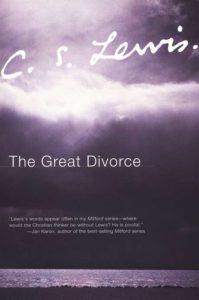Because God Says So
 I’m a big believer in the Bible and in the idea that Christian storytellers have a huge opportunity to speak truth into the lives of people in such a way that they are more inclined to listen. I am coming to understand, however, that what I see as truth, others interpret as fairy tales.
I’m a big believer in the Bible and in the idea that Christian storytellers have a huge opportunity to speak truth into the lives of people in such a way that they are more inclined to listen. I am coming to understand, however, that what I see as truth, others interpret as fairy tales.
From Jill Carattini of the Ravi Zacharias International Ministries in her article “To Hear the Horns of Elfland”:
Of the many objections to Christianity, it is this one that stands out in my mind as troubling: that to be Christian is to withdraw from the world of reality, to follow fairy tales with wishful hearts and myths that insist we stop thinking and believe all will be right in the end because God says so.
The thing is, all will be right in the end, because God says so. So I agree with Ms. Carattini: the objection is troublesome because it points a finger at Christianity and says “reality” doesn’t verify belief in the “fairy tale” ending.
In some small part, I think Christian writers have the responsibility to dispel this objection, to demonstrate the way the world really works.
C. S. Lewis did that for me. When I was young, I was deathly afraid of dying. I remember driving past a burned home and thinking of people dying in the fire. I remember hearing ambulance sirens and imagining the people whose lives might be hanging in the balance.
Primarily, I didn’t want to die, and told my mother so when I was about five. All during childhood I had false ideas about dying. For some time I thought it meant I would come to an end–simply cease to be. Then I thought it meant I would become one with a great consciousness (I don’t know where I got that notion), and finally that I would be in some sort of angelic state where I would sit around on clouds playing a harp.
As I grew older, I tried not to think about dying. Then I read Lewis’s The Great Divorce.
That book simply revolutionized my understanding. Life after life is what’s real, what’s solid, and it is the temporal life we now experience that is wispy and ephemeral. Imagine my surprise to learn that Lewis’s view was also Scriptural. (“Yet you do not know what your life will be like tomorrow. You are just a vapor that appears for a little while and then vanishes away” James 4:14).
The thing is, C. S. Lewis didn’t correct my thinking by giving me a theological treatise on the after life. Rather, he showed, from his imagination, the reality of life beyond this life. No, I’m not suggesting that Lewis had some vision of heaven and that he gave an account of what we can expect to which I must cling as if it is Scripture itself.
What Lewis did was alter my understanding by giving his own imaginative version that contradicted everything I’d thought before. He showed eternal life to be the true reality, not the vaporous wisp I’d imagined it to be. He showed heavenly riches to be far surpassing anything of earthly substance. He portrayed heaven to be rich with certainty and joy, and hell to be isolating and filled with selfishness.
A fairy tale? Indeed. Lewis made up his Gray Town and his Ghosts and Solid People, but in so doing, he showed me, at least, that life after life is what matters most, that this prologue we’re in is critical but not complete in and of itself, that its meaning is in relation to the whole story.
 In the same way, I think Christian speculative writers can counter the objections Ms. Carattini finds troubling. We can show that Christianity is not withdrawal, that having God’s word to verify a thing is the best evidence of all, and that fairy tale endings aren’t happily ever after for people like the wicked witch or the Big Bad Wolf.
In the same way, I think Christian speculative writers can counter the objections Ms. Carattini finds troubling. We can show that Christianity is not withdrawal, that having God’s word to verify a thing is the best evidence of all, and that fairy tale endings aren’t happily ever after for people like the wicked witch or the Big Bad Wolf.
As she noted in her article
Christianity is . . . far from an invitation to live blind and unconcerned with the world of suffering around us, intent to tell feel-good stories or to withdraw from the harder scenes of life with fearful wishes.
In the same way that George MacDonald opened C. S. Lewis’s understanding of spiritual things, and Lewis opened mine and a host of other writers’, I think it’s natural that we pay forward what we received. We have the opportunity to do what he did in our stories. As biographer Alan Jacobs put it, “[Lewis’s] real power was not proof; it was depiction” (The Narnian: The Life and Imagination of C.S. Lewis p. 312).
By emulating Lewis’s purpose to show truth in concrete terms, we can dispense with the notion that what God says is merely a fairy tale. In other words, we can use “fairy tales” to kill the notion that God’s work and word is a fairy tale. Ironic, isn’t it!






























I agree, I think. But there’s another factor going on here. I read many books for sheer entertainment. I don’t want bummer endings. I want good to triumph, and the bad to be dealt with. I want the couple to get together legally with no hanky-panky beforehand. If you’re writing escapist stuff, like fantasy, I’ll complain loudly if you do not give that to me. Now, if you’re writing about reality—speculatively, I expect the unexpected. A spouse may be killed [though if they are believers I expect a little jealousy that the other got to go home first]. 😉 For us, death is a good thing, we get to go home. For the bad guys, it’s the fiery road. Let’s make spiritual warfare real, physical warfare only if unavoidable, and emotional battles a realistic depiction of the risks involved in giving into emotions and falling away from faith.
Hopefully that was worth 2cents
One of my presumed truths at SpecFaith is that “sheer entertainment” is actually more “entertaining,” that is it brings more joy, when this desire and action are specifically harnessed as acts of worship for the glory of God. I think that some Christians who say they enjoy things for “sheer entertainment” are doing this without knowing it — though they often say they only enjoy the entertainment. 🙂
Yup, i think you’re right
Good article on how stories can help us to finally see things.
One of my favorite examples of this is “Till We Have Faces” – which is, in my opinion, C. S. Lewis’s most brilliant novel. It’s a retelling of the myth of Cupid and Psyche, and the world is presented as pagan: gods and human sacrifice.
The book is written in first-person, as Orual’s complaint against the gods. She spends the narrative scrupulously laying down her case against them, and she seems so right. Then Lewis knocks out the ground from under her.
Atheists, unbelievers – even Christians in hard times – have wanted to make their own complaints against God. This retelling of a pagan myth shows powerfully how we can seem so right in our complaints and yet be so wrong.
“Till We Have Faces” reminds me of the Book of Job. Job wanted to put his case before – and against – God, as Orual did. They never really received an explanation for what happened to them, but both were satisfied in the end. “Before your face questions die away.”
I really like Till We Have Faces,, especially because Lewis uses the unreliable narrator so well. An insightful reader will begin to question Orual’s judgment before she does, but the moment where she realizes how she really treated Pysche–wow.
Well said!